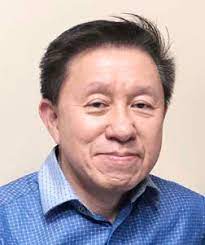UNDER THE MICROSCOPE

It was with some hesitation that I accepted an invitation to fly to China, specifically Guangxi province, for the First Bonsai Clubs International (BCI) Landscape Bonsai International Convention, knowing the growing tension that continues to fester between China and the Philippines over the West Philippine Sea (traditionally called the South China Sea). Should war break out during the time we were there, we might have been stranded during the hostilities. But the lure of seeing the dramatic landscape of its limestone karst hills amid the two lakes and connecting rivers that inspired beautiful paintings by Chinese artists of the past proved too strong to refuse.
The Philippine delegation of 35 people was the largest among the participants from other countries. We landed in Guangzhou and after an overnight stay, traveled by train to Liu Zhou. The convention was a smashing success with the Chinese hosts sparing no expense in wining and dining us all. The exhibits were magnificent and never have I seen so many bonsai of the highest standards (I keep a few bonsai myself).
What struck me during our travels was how China, from being a dirt-poor country as late as the 1980s, has transformed itself into the second biggest economy in the world, and reduced its extreme poverty rate to almost nothing from 88 percent in 1981 (per World Bank calculations). Actually, when I first went to China in 1995, Beijing was still relatively third world and the streets were dusty and filled with bicycles, with very few cars or even motorcycles then. Majority of Chinese then lived in the traditional hutongs and high-rise buildings were few and far between.
Now, we didn’t see any evidence of poverty like we have in the Philippines (slums, street beggars/homeless and rampant crime). Instead, we saw glistening, sleek, modern skyscrapers and apartments, free-flowing traffic, mostly electric vehicles with no discernible pollution, decently-dressed and employed people, and a thriving economy.
Reading an English language newspaper on the plane, I came across an article in which a high-ranking Chinese Communist Party official was convicted of accepting bribes in the millions of US dollars and was sentenced to death. There have been several instances of these convictions where the guilty were executed. This time, it was a suspended sentence for two years during which, if he behaved well in prison, may merit a commutation of the death sentence to life imprisonment without possibility of parole.
Now, that is the polar opposite of what we see in our country, where persons facing charges of plunder or other crimes can even run for office, usually with success. And therein lies the big, glaring difference. It doesn’t matter if it’s a communist country or democracy, it is corruption that is the biggest drag on a country’s progress.
Vietnam is another communist country that is now passing us in terms of economic growth. In spite of a war that ravaged the entire country during the 1970s, it is now a fast-rising economy and is even manufacturing its own electric cars, which will soon be exported to the Philippines. It also executes convicted plunderers.
No, I’m not advocating turning the Philippines into a communist country. Far from it. My dearly departed father, who was a staunch anti-communist, would be turning in his grave if I even think about it.
But we can learn a lesson or two from these two communist countries on how to deal with corruption. Similarly, Singapore is not a picture-perfect democracy, but the way it chooses its leaders is something to aspire for.
Recently, Lawrence Wong was sworn in as Singapore’s fourth prime minister since its independence, and its first in 20 years. It was a carefully executed transfer of power after an exhaustive search. He was chosen on his merits, being American-educated, with double master’s degrees in applied economics (University of Michigan), and in public administration (Harvard University). Plus, he has no record of corruption, or even a driving violation.
How much further can this be from our political system? The only things we require from candidates from public office is that he/she is a Filipino citizen (even that is negotiable per Alice Guo/Guo Hua Ping), of a certain age and can read and write. There is absolutely no provision whatsoever for any kind of competence/integrity needed for particular positions.
Surveying the current crop of candidates for the highest officials of the land, we see a plethora of actors/comedians, a boxer, and political dynasts making politics a way of living.
Yet, we continue to elect into office these people who haven’t the slightest idea how to craft laws, manage the economy and defend our borders.
How do we rise from our current economic morass with our current and future crops of leaders?
Surely, we deserve what we get, democracy be damned.